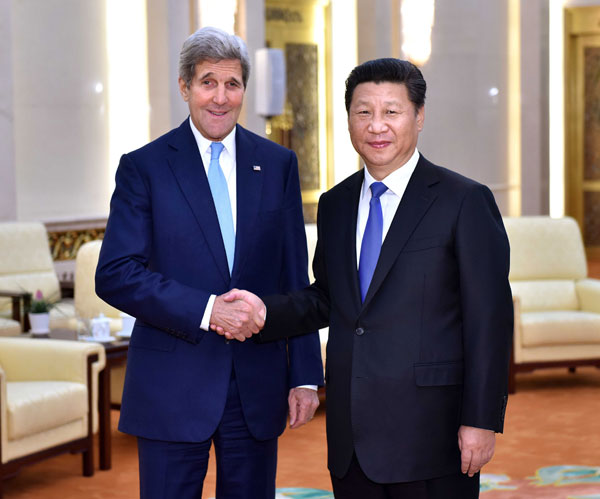Kerry's visit looks to the future despite disputes
- By Tim Collard
 0 Comment(s)
0 Comment(s) Print
Print E-mail China.org.cn, May 25, 2015
E-mail China.org.cn, May 25, 2015
|
Chinese President Xi Jinping (R) meets with US Secretary of State John Kerry at the Great Hall of the People in Beijng, capital of China, May 17, 2015. [Photo/Xinhua] |
United States Secretary of State John Kerry visited China this month for talks that were widely expected to be overshadowed by disputes over security issues. But it is far too easy to focus on those issues that make headlines in a complex and multifaceted relationship and to divert attention from the long and less immediately exciting business of building up a relationship for the very long term. Both the U.S. and Chinese governments were too sensible to let the visit be hijacked in this way.
It is obvious that two great powers such as China and the U.S. will have differing views on important issues and will make their positions clear; an ambiguous presentation of national positions can only lead to potentially dangerous misunderstandings. But there are numerous good reasons to avoid concluding that the U.S.-China relationship is undergoing fundamental difficulties.
The timing of Kerry's visit had nothing to do with any tensions in the two countries' relationship. In fact, it was quite the reverse: the visit was part of preparations for what promises to be a ground-breaking visit to the U.S. by China's President Xi Jinping later this year. In this context, President Xi held personal talks with Kerry and expressed the view that "the China-U.S. relationship remains stable on the whole," and that "the new format of the China-U.S. relationship has witnessed an early harvest." Not unnaturally, President Xi emphasized that U.S.-China exchanges must take place on the basis of equality and mutual respect, but I believe this is now generally understood, and that the U.S. is gradually adjusting to China's new position in the world. Xi added that he "looked forward to continue to grow this relationship" during his upcoming visit to the U.S.
Premier Li Keqiang told Kerry that China is ready to strengthen exchanges and communication across the board to increase understanding and bilateral coordination not only on general global issues, but specifically within the Asia-Pacific region. Thus, the larger relationship between the two major powers of the 21st century transcends the occasional - and inevitable - dispute. Both sides need to aim for mutual respect and win-win cooperation.






